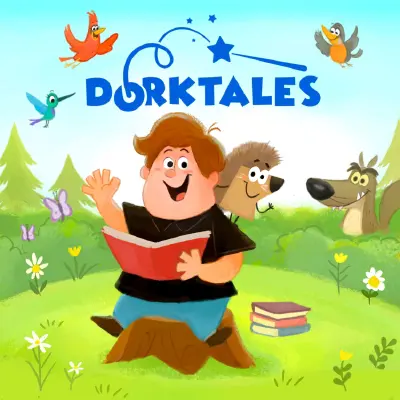Podcasts about Education for Kids
Episodes about Education for Kids
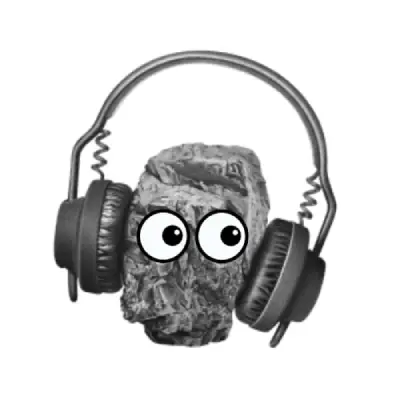
Today’s poem–from British humorist Roger Woddis–is a witty-yet-withering sendup of double-morality. Happy reading. This is a public episode. If you'd like to discuss this with other subscribers or get access to bonus episodes, visit dailypoempod.substack.com/subscribe

Jul 07, 2025
Replay - Summer Song Series - Bomba Te Traigo Yo!
Eat Your Spanish: A Spanish Learning Podcast for Kids and Families! ❭
Here is a flashback to one of our favorite songs from the Spanish Summer Song Series! We hope you enjoy!Download the 2023 Spanish Summer Song Playlist Below!Spotify - https://open.spotify.com/playlist/3SZm5sf5Aw95xKFjWYAxvE?si=TRJ2t5D7SpCjjpWrRpvQNQApple Music - https://music.apple.com/us/playlist/eat-your-spanish-summer-song-playlist-

330: How I Use AI to Kickstart Creativity Use AI to kickstart creativity—yes, it’s possible! In this episode, Meryl van der Merwe shares seven practical ways she uses AI tools like ChatGPT to spark and support creative thinking. Hopefully, this will give you ideas on how you can use AI as a helpful collaborator when […]
The post How I Use AI to Kickstart Creativity appeared first on Ultimate Homeschool Podcast Network.

Some brief relief from the high humidity is on the way. Pop up storms are possible for the holiday weekend coming up.See Privacy Policy at https://art19.com/privacy and California Privacy Notice at https://art19.com/privacy#do-not-sell-my-info.

Jun 29, 2025
196. Gratitude Journalling for Students
Exam Study Expert: ace your exams with the science of learning ❭
A simple daily practice to have happier, more productive days: gratitude journalling for students.*Hosted by William Wadsworth, memory psychologist, independent researcher and study skills coach. I help ambitious students to study smarter, not harder, so they can ace their exams with less work and less stress.BOOK 1:1 COACHING to supercharge your exam success: https://examstudyexpert.com/workwithme/Get a copy of Outsmart Your Exams, my award-winning exam technique book, at https://geni.us/exams*Today's references:Jeliseh, M.T., Valizadeh, M., Zohrabi, M. and Xodabande, I. (2025), Enhancing Language Teachers' Well-Being Through Positive Psychology Interventions: A Mixed-Methods Study Focusing on Gratitude Journaling. Psychology in the Schools. https://doi.org/10.1002/pits.70005Tolcher, K., Cauble, M., & Downs, A. (2022). Evaluating the effects of gratitude interventions on college student well-being. Journal of American College Health, 72(5), 1321–1325. https://doi.org/10.1080/07448481.2022.2076096Redwine LS, Henry BL, Pung MA, Wilson K, Chinh K, Knight B, Jain S, Rutledge T, Greenberg B, Maisel A, Mills PJ. Pilot Randomized Study of a Gratitude Journaling Intervention on Heart Rate Variability and Inflammatory Biomarkers in Patients With Stage B Heart Failure. Psychosom Med. 2016 Jul-Aug;78(6):667-76. doi: 10.1097/PSY.0000000000000316. PMID: 27187845; PMCID: PMC4927423.**As an Amazon Associate, I earn from qualifying purchases on suggested books.Questions? Comments? Requests? Or just want to say "thanks" - send me a text message (I read them all!).

It’s time for another trip around the solar system on the BIGGER and BETTER Science Weekly! In this episode of the Fun Kids Science Weekly, we answer YOUR questions, have scientists battle it out to determine which science is the best, and this week we're learning all about the secret to staying young. Dan kicks things off with the latest in science news. First up, a surprising discovery — killer whales caught on camera giving each other massages! Then, we zoom out to the cosmos with a powerful new telescope in Chile that's captured some truly breath-taking images of deep space. And finally, Professor Samantha Ward, an expert in zoo animal welfare, joins Dan to explain the big changes coming to zoo standards across the UK. Then, we answer your questions! Leo wants to know: Why people are allergic to different things and Dr. Jackie Boyd from Nottingham Trent University answers Benji's question: Can animals laugh? In Dangerous Dan, we learn all about the Cookie Cutter Shark! In Battle of the Sciences, sports scientist, Daniele Magistro, joins Dan to reveal the secret to staying young. uncover the creepy world of zombie plants What do we learn about? · What killer whales have been caught doing· Improvements to UK zoos · Why people are allergic to things· Can animals laugh?· And in Battle of the Sciences, the secret to staying young! All on this week's episode of Science Weekly!Join Fun Kids Podcasts+: https://funkidslive.com/plusSee omnystudio.com/listener for privacy information.
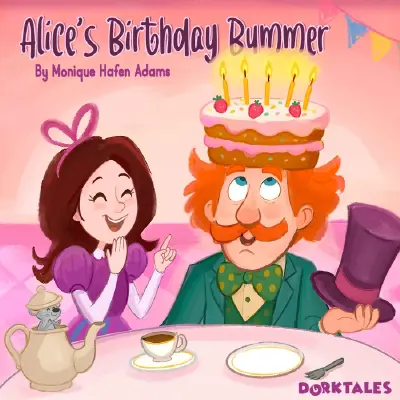
Send us a textIn Wonderland, nothing is ever quite what it seems, including Alice’s birthday. The White Rabbit, who promised to celebrate with her, keeps darting off in all directions. Even the Mad Hatter deflates her hopes for a special day when he un-invites her to tea—because it’s not her unbirthday. Feeling lost and forgotten, Alice wonders if anything can turn the day around—until the Cheshire Cat appears with a curious new path to follow. In a land where left is right and up is down, a day full of bummers might just bounce back into the best birthday yet.Go to the episode webpage: https://jonincharacter.com/alices-birthday-bummer/DOWNLOAD COLOR PAGE: https://bit.ly/dorktalesEP114colorpage GRAB YOUR FREE PDF list of conversation questions for this episode: https://dorktalesstorytime.aweb.page/ep114freePDF PARENTS, TEACHERS AND HOMESCHOOLERS: In “Alice’s Birthday Bummer,” young listeners journey through the emotional ups and downs of a birthday that doesn’t go as planned. As Alice faces disappointment, confusion, and the chaos of Wonderland, she also learns the importance of expressing her feelings, leaning on her friends, and staying open to unexpected joy. The story gently encourages emotional resilience, empathy, and the idea that a “bad day” can still hold a happy ending.IF YOU ENJOYED THIS STORY about Alice in Wonderland, you may like these episodes:Alice in Slumberland https://jonincharacter.com/alice-in-slumberland/ Jabberwock This Way https://jonincharacter.com/jabberwock-this-way/ CREDITS: This episode is a Jonincharacter production. It was written by Monique Hafen Adams, edited and produced by Molly Murphy and performed by Jonathan Cormur and Sabrina Glow. Sound recording and production by Jermaine Hamilton at Pacific Grove Soundworks.Join the Summer Listening Challenge—find out more and get your tracker: https://jonincharacter.com/summer-listening/Support the showREACH OUT! Send us a TEXT: if your young listener has a question. Pls include their first name in the text. Your name/number is hidden so it's a safe way to reach out. Send us an email: dorktalesstorytime@gmail.com DM us on IG @dorktalesstorytime Library of Resources: https://dorktalesstorytime.aweb.page/Dorktales-Library-Card One time donation: https://www.buymeacoffee.com/dorktales Our Pod's Songs on Bandcamp: https://dorktalesstorytime.bandcamp.com/music Now, go be the hero of your own story and we’ll see you next once-upon-a-time!
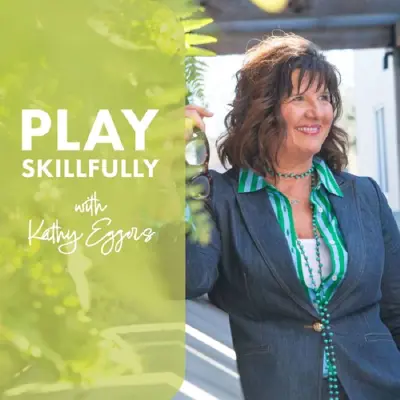
Jun 26, 2025
The Long Game of Play: A Mom's Story After 10 Years with A Year of Playing Skillfully
Play Skillfully ❭
In this conversation, Kathy Eggers and Keri Vasek discuss the curriculum 'A Year of Playing Skillfully,' exploring its impact on homeschooling and child development. They emphasize the importance of play in learning, share personal experiences, and provide insights into how the curriculum can be adapted to fit various parenting styles. The discussion also touches on social-emotional learning and the challenges of homeschooling, ultimately highlighting the joy and magic of watching children learn through play.You can check out a sample of the 2nd edition of A Year of Playing Skillfully or purchase your own copy on my website.You can find Keri on Instagram and her book, Kisses From Space on my Amazon Store. For more information, check out Kathy's book, The Homegrown Preschooler and curriculum, A Year of Playing Skillfully. You can also sign up for Kathy's monthly newsletter on her website or by commenting NEWS on any IG post. Thanks for listening. If you have topics you would like for us to discuss or people you would like to hear from, let us know at hello@kathyeggers.com or shoot us a message on Instagram. Don’t forget to subscribe to our podcast and leave a review on iTunes!!! Also, to thank you for listening, you can receive a 10% discount on any purchase at the Kathy Eggers store by using the code, PSPODCAST.

Jun 25, 2025
Big Changes to Student Lending in the One Big Beautiful Bill Act (with Preston Cooper)
The Report Card with Nat Malkus ❭
About one month ago, the House passed the One Big Beautiful Bill Act, a massive bill aimed at advancing President Trump’s domestic policy agenda. Now, the bill is with the Senate.Included in the bill are huge changes to student lending. In particular, the One Big Beautiful Bill Act would make drastic changes to loan limits, repayment plans, and the rules for which programs are eligible to participate in the student loan program.What is the rationale behind these changes? How would these changes affect students and schools? And will the One Big Beautiful Bill Act become law?On this episode of The Report Card, Nat Malkus discusses these questions, and more, with Preston Cooper.Preston Cooper is a senior fellow at AEI, where he studies higher education policy. He also serves on the Board of Visitors for George Mason University.Show Notes:Senate Embraces “Do No Harm” for Higher EducationThe Senate’s Higher Education Reforms Are Strong (But Could Be Stronger)How The “One Big Beautiful Bill Act” Would Hold Colleges Accountable For Outcomes
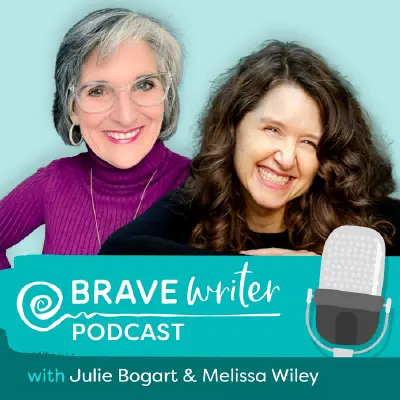
Do we still need human storytellers in an age where technology can generate stories and essays with a click? This episode explores why nothing can replace the warmth and connection that come from sharing stories aloud as a family. We talk about the generational bonds formed through storytelling, the irreplaceable value of reading aloud, and how these practices create both readers and resilient human beings. We also reflect on our evolving feelings about artificial intelligence—how it can be both fascinating and unsettling—and why human relationships and creative self-expression must remain at the heart of education.Resources:Don’t miss the replays of our confetti-filled book reveals that kick off a year of reading, learning, and connection! Tune in here: bravewriter.com/landing/book-revealPurchase Julie’s new book, Help! My Kid Hates Writing!Check out Julie’s new author website: juliebogartwriter.comSubscribe to Julie’s Substack newsletters: Brave Learning with Julie Bogart and Julie Off TopicTry out our Brave Writer Practice PagesLearn more about the Brave Writer Literature & Mechanics programsRead all Brave Writer class descriptionsRead Diabolus Ex Machina by Amanda GuinzburgStart a free trial of CTCmath.com to try the math program that’s sure to grab and keep your child’s attentionSign up for our Text Message Pod Ring to get podcast updates and more!Send us podcast topic ideas by texting us: +1 (833) 947-3684Connect with Julie:Instagram: @juliebravewriterThreads: @juliebravewriterBluesky: @bravewriter.comFacebook: facebook.com/bravewriterConnect with Melissa:Website: melissawiley.comSubstack: melissawiley.substack.comInstagram: @melissawileybooksBluesky:
